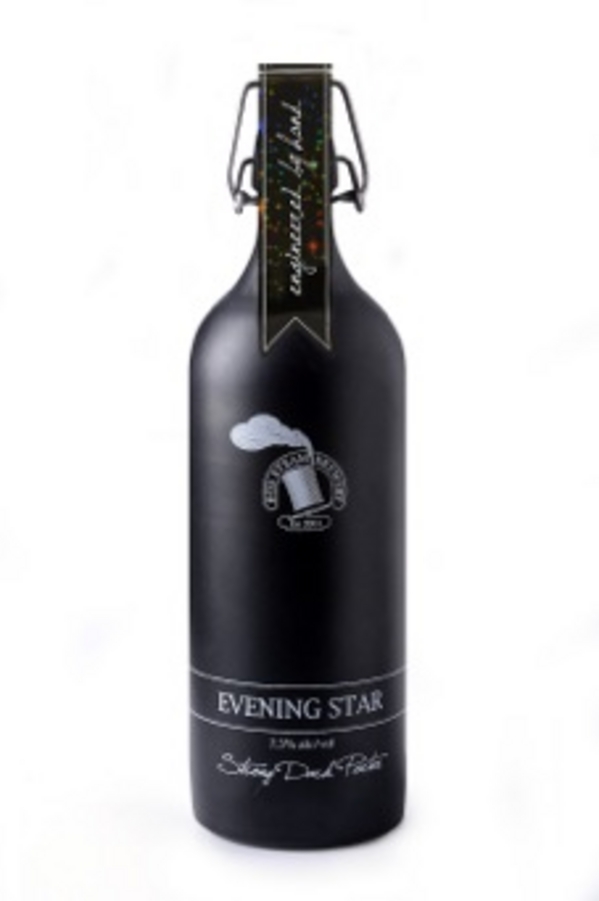Not Boxed in: Wilts brewery steams ahead but pays homage to rail giant Brunel
Added: Friday, December 27th 2013
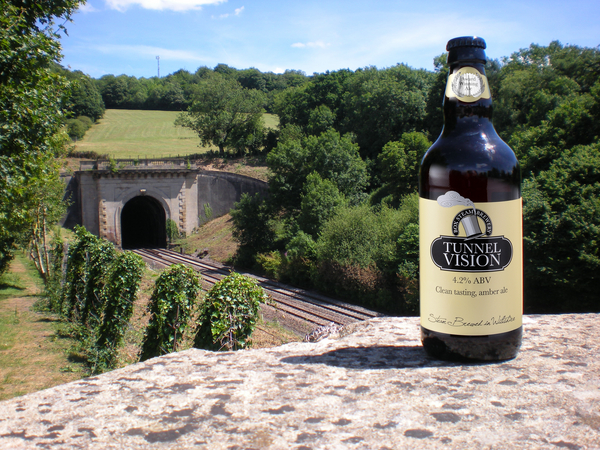
The Box Steam brewery lives up to its name – it’s a modern plant but one that’s rooted in the history of the age of steam. It pays homage to the memory and achievements of the great railway engineer Isambard Kingdom Brunel who dug the Box Tunnel in Wiltshire that linked London to Bristol in the 19th century.
The 1.8 mile tunnel was dug through Box Hill between Bath and Chippenham. Work started in 1838 and was completed three years later, allowing trains to run from London Paddington to Bristol.
Many of the brewery’s beers have railway and Brunel themes, and – a neat touch – the copper in the brewhouse is powered by a Fulton steam engine. The most recent addition to the beer range forms a bridge between brewing in the 18th and 19th centuries and the last huffs and puffs of the steam age. Evening Star is a 7.5% Porter, the London beer style that launched commercial brewing at the dawn of the industrial revolution.
And it’s the name of the 999th steam locomotive commissioned by British Rail. It was the last broad gauge steam loco and it was built just 30 miles from Box. It’s now housed at the railway museum in York.
The brewery dates from 2004 and its current size and success are summed up by that old Australian song that says there’s nothing so lonesome, morbid and drear than to stand in the bar of a pub with no beer. One busy bank holiday weekend in 2004, the Cross Guns at Avoncliff ran dry. The pub is owned by the Roberts family and when their usual supplier, Scottish & Newcastle, couldn’t deliver more beer, the Roberts turned in desperation to the small Box Brewery in the village of the same name.
The 10-barrel plant – former Bath Ales kit -- was run as a hobby brewery by Mark Hempleman Adams and Marshall Ewart. They delivered 15 nine-gallon firkins to the Cross Guns and the beer was drunk in a couple of days. The brewery owners couldn’t keep up with demand and they didn’t want to expand production. Their solution was to offer to sell the brewery to the Roberts and in 2006 Andy Roberts, whose only experience was occasional home brewing, found himself in charge of grown-up kit and two pubs to supply. The family – Ken, Jennifer and Andy – had bought a second pub, the Inn at Freshford, and they were, Ken admits, “a bit stretched”.
They needed to expand production and supply more pubs. Their success can be measured by the fact that in 2008 the brewery moved to two units on a former farm in Holt. It’s spread to six units and has a 50-barrel kit that brews three times a day. The mash tun, liquor tanks, copper and fermenters comprise some new equipment with other parts from the Shaftesbury Brewery in Dorset and Sharp’s in Cornwall. There are plans to add two additional fermenters to the four now working full bore to keep up with demand.
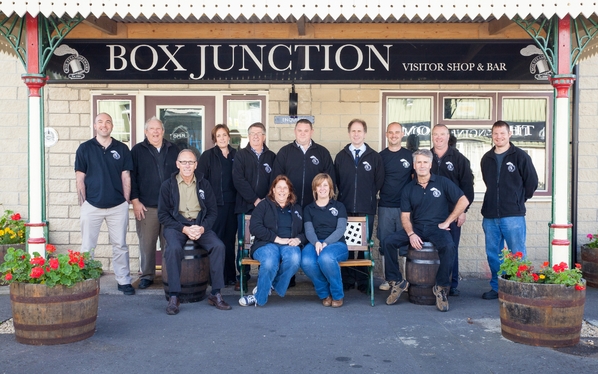
From humble beginnings, Box Steam is now an impressive and efficient concern. Andy Roberts is the managing director and has handed over the brewing reins to Phil Downes, former head brewer at Ridley’s in Essex and Wickwar in Gloucestershire. Phil’s job at Wickwar, where he brewed the award-winning Station Porter, was clearly a warm-up session for his role at Box Steam. He has been joined by David Southway, former sales director for Carlsberg in the South and South West, and marketing manager Reuben Horsley.
Box Steam’s first beer and its leading brand was Tunnel Vision (4.2%) with an image of the Box Tunnel on the label. It set out the brewery’s stall as the champion of the life and work of Brunel. The diminutive 5ft 3ins engineer – with help from his ever-present stove-pipe hat -- became the railway giant during the industry’s formative period.
The cask version of Tunnel Vision is listed with Wetherspoon’s. “It helps grow the brand – and we do make money from it,” David Southway says, dispelling the belief that the chain’s demand for deep discounts means smaller breweries can’t profit from their sales. Carlsberg distributes Box Steam beers nationally and they are available in Punch, Mitchells & Butlers and Stonegate pubs.
The brewery delivers beer itself within a 50-mile radius and has 1,700 customers. Its beers have recently reached as far as Oxford. David Southway plans to use a chain of 30 wholesalers to build national sales and is keen to do more business in the north.
Sales of bottled beer are growing, with listings in Tesco and Bargain Booze and an impressive export drive that includes Australia, Brazil, Cambodia, Canada, Mexico and Taiwan. Keg versions of the draught beers are served from single trip Petainer vessels. The kegs have a six-month shelf life and are used mainly for export.
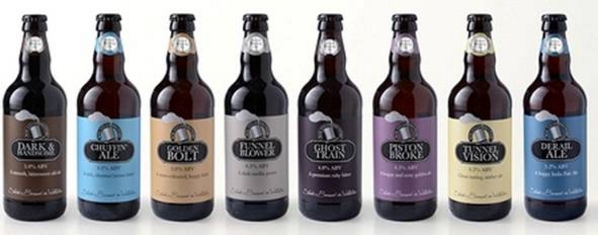
Andy Roberts has a simple attitude to brewing: “We brew beers we like,” he says. But he welcomes feedback and listens carefully to what pub landlords say about Box Steam beers. He and his team believe in using British ingredients as far as possible. Malted barley is supplied by Warminster Maltings just seven miles away – “the best malt you can get,” Phil Downes says, who uses Maris Otter as his base pale malt. His hops, used in whole leaf form, include Bramling Cross, Challenger, Fuggles, Goldings, Progress and Target, with smaller amounts of American Cascade, Chinook and Citra, and Saaz from the Czech Republic. Wessex water is hard and is ideal for brewing pale ales and bitters.
Tunnel Vision is brewed with pale malt, 10% crystal malt and a tiny addition of chocolate malt. The hops are Challenger and Progress. The bronze coloured beer has an aroma reminiscent of Madeira wine with piny and spicy hops. Tart fruit build in the mouth with creamy malt and spicy hops, followed by a bittersweet finish with hop resins, vinous fruit and a rich “fruit cake” malt note.
Golden Bolt (3.8%) commemorates the fact that Brunel used one golden bolt on everything he built – locos, ships and bridges: there’s a single golden bolt on the Clifton Suspension Bridge in Bristol. The beer is brewed with pale malt and a small proportion of crystal. The hops are Fuggles and Progress. There’s a delicious hint of butterscotch and vanilla on the nose followed by a dry palate with spicy hops and biscuit malt. The finish is dry and bitter with continuing notes of butterscotch, vanilla and spicy hop resins.
Chuffin’ Ale (4%) is brewed with pale malt and low colour chocolate malt and uses just Fuggles hops. There’s a hint of chocolate on the nose with a touch of vanilla and rich biscuit malt. There’s a big hit of orange fruit in the mouth with spicy hops and juicy malt. The fruit note is more pear-like in the finish, with a dry malt and hop end.
Piston Broke (4.5%) is the brewery’s second biggest-selling beer and, along with Derail Ale, records the fact that building the railway and running trains had its pit-falls, even for Brunel. It’s a beer with a massive fruit character from pale malt and American Cascade hops, with Goldings for bitterness. There’s sherbet lemon on the aroma with citrus fruit, hop resins and a digestive biscuit malt note on the palate. The finish is bittersweet, with continuing citrus fruit balancing biscuit malt and bitter, tangy hops.
Derail Ale (5.2%) marks a a major crash on the line – it was not always easy going for Brunel and his team The beer is Box Steam’s interpretation of a India Pale Ale and is brewed with pale and crystal malts and hopped with Cascade, Chinook and Progress varieties. The burnished pale bronze beer has a superb aroma of tart citrus fruit, juicy malt and floral hops, followed by a palate dominated by tangy fruit, floral and resinous hops and biscuit malt. The long, lingering finish starts malty and fruity but ends dry and bitter with continuing notes of bittersweet hops.
In sharp contrast, Dark and Handsome (5%) is a winter warmer in cask, available in bottle all year round, and pays deep respect to the memory and work of Brunel. It’s brewed with pale, crystal and both pale and dark chocolate malts. The hops are Bramling Cross, Cascade and Challenger. The beer has a big vinous fruit nose, with bitter hops and espresso coffee notes. Blackcurrant fruit – the signature of Bramling Cross – builds in the mouth with creamy and burnt malts. The finish is long and dry with vinous fruit, creamy malt, coffee and peppery hops.
Evening Star (7.5%) is aged in cask for four months before being bottled in black stone bottles with swing stoppers. It’s brewed with pale and chocolate malts and roasted barley and is hopped with Challenger and Progress. There’s an intriguing hint of mint on the aroma with roasted grain, espresso coffee and chocolate. An After 8’s minty note is evident on the tongue, with burnt fruit, espresso and bitter hops. The finish is dry, with a powerful roasted grain note, vinous fruit, creamy malt, bitter hop resins and chocolate and coffee.
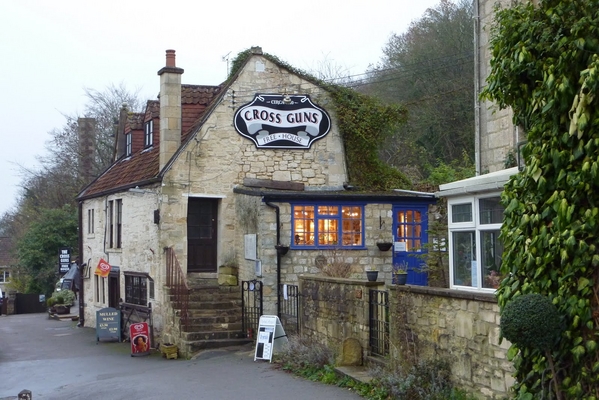
The pubs – rivers, canals and railways
The two pubs run by the Roberts family and Box Steam are rich in history. The Inn at Freshford and the Cross Guns at Avoncliff both date from the 16th century and have thick stone walls, heavy timbers, open fires, beer gardens, and good ale and food. They both stand on the banks of rivers, the Frome in the case of the Inn and the Avon alongside the Cross Guns.
Parts of the Cross Guns are even older and are thought to date from the 15th century. It was first called the Carpenters Arms and was used for centuries by workers from the local mill in Avoncliff. The mill owners gave special coins to the workers to spend in the pub. When the Kennet & Avon Canal was built in the 18th century it ran alongside the pub across an aqueduct. The pub became a popular stopping point for bargees, who were able to stable their horses there.
The railway arrived in the 19th century. The pub’s beer garden runs down to the Avon and on the other side of the river Avoncliff station was once a halt where passengers had to arrange with train conductors or station staff to be put off and picked up. It’s now a regular stopping place. The line was earmarked for closure by Dr Beeching in the 1960s but it was saved.
The pub’s name was changed to the Cross Guns in the 19th century to mark the local 9th Battalion of the Wiltshire Volunteers. In the 20th century, the pub was owned by the Trowbridge brewery, Ushers. It was bought by the Roberts family in 1999. As well as excellent food and the full range of Box Steam beers, the pub has first-class accommodation and is an ideal place for walking and touring in the area.
And you can arrive in style at Avoncliff station.
